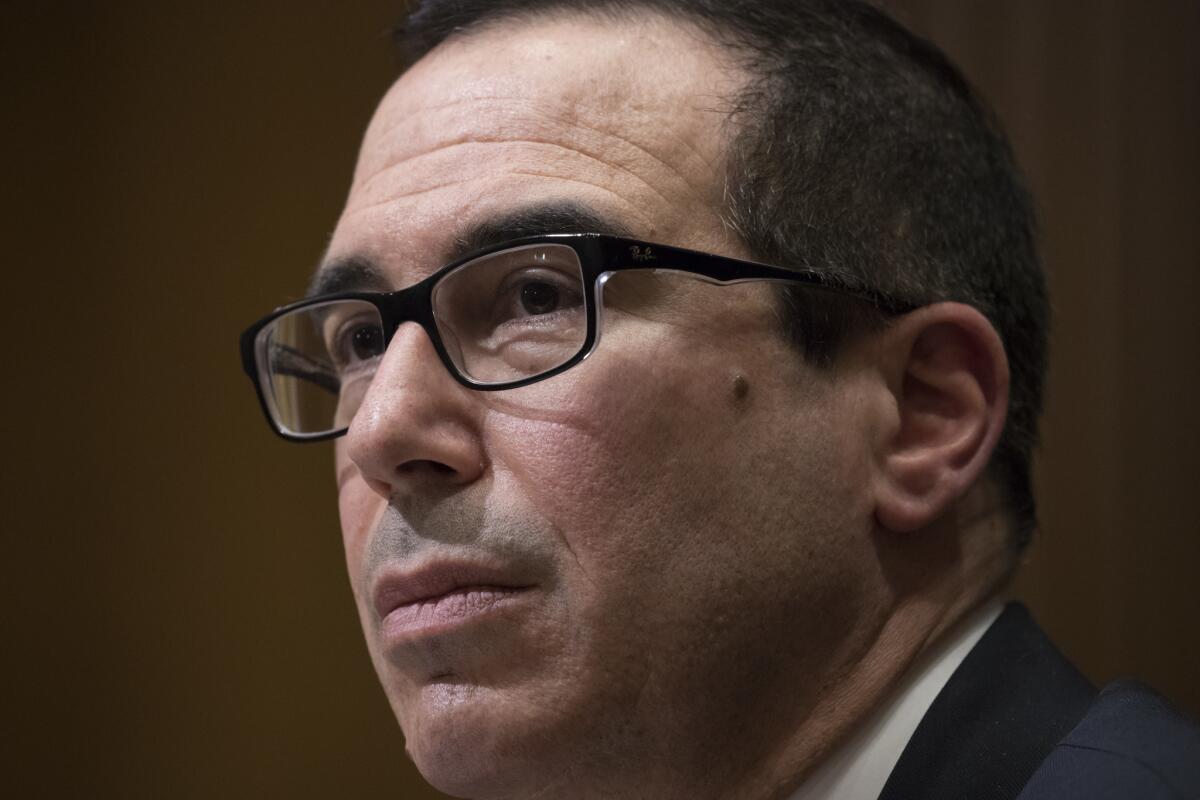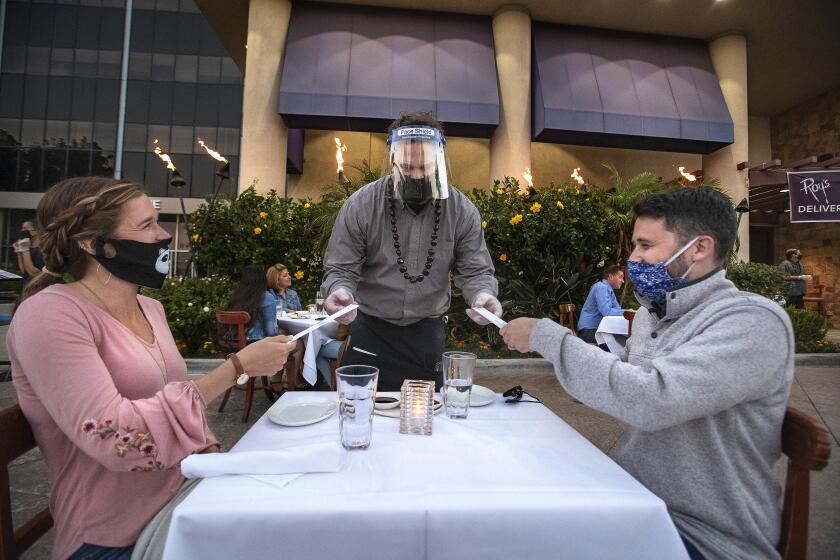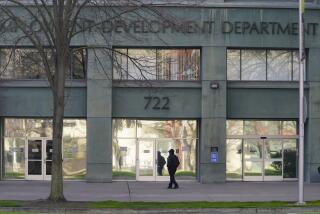Feds begin prosecuting coronavirus PPP loan fraud. Some companies may fight back — and win

- Share via
WASHINGTON — One Los Angeles business owner allegedly went to Las Vegas and gambled away some of the $9 million he received in emergency government loans earmarked for his employees.
A Texas man is accused of using his $1.5-million Paycheck Protection Program funds to pay off a mortgage, while another loan recipient in Georgia is charged with using his $2-million loan to buy a car, jewelry and to pay child support.
A Washington, D.C., applicant fabricated Social Security numbers in an attempt to collect money for employees he didn’t really have, federal prosecutors say.
Ever since the public backlash last April against some large, well-off or nationwide companies that helped themselves to emergency government funds intended to rescue small businesses during the pandemic, federal officials have vowed to crack down on any abuses of the popular program, also known as PPP.
That effort is now underway with more than a dozen criminal cases filed in 11 states in recent weeks. All involve allegations of blatant fraud, such as lying on applications, falsifying tax or business records and misappropriating money. And most involve relatively small businesses or individual owners.
Federal officials call it the start of what they promise will be a rigorous vetting of the PPP to ensure government dollars were not misused. The program has doled out 4.9 million loans worth $518 billion to businesses nationwide and is accepting applications through Aug. 8.
But legal experts and former federal prosecutors note that the first crop of cases appear to represent mostly the low-hanging fruit. The real test, they say, will be how aggressively the government brings charges against larger, publicly traded companies over allegations that they didn’t really need the money, or against other recipients who qualified under the original rules but were later deemed ineligible under updated ones.
“The storm is in the making,” said attorney Nick Oberheiden, who specializes in defending companies under government investigation, particularly Medicare fraud. He predicted more cases will be filed. “We are deep in those investigations, for very sure.”
But those cases could be much harder to prove in court, he and others warned.
For starters, ever since Treasury Secretary Steven T. Mnuchin announced the government may go after businesses that unfairly took advantage of the PPP’s forgivable loans, companies have been preparing to defend themselves.
Some opted to avoid the legal hassle and negative publicity — President Trump publicly shamed several recipients — and simply returned the money, including Ruth’s Chris Steak House, the L.A. Lakers and the Shake Shack hamburger chain. About $30 billion was returned, Mnuchin recently told House members.
But others balked, insisting they had faithfully followed the program’s rules and essentially daring the government to come after them.
Some insurance companies are now even offering policies specifically to protect companies if the government tries to claw back the money, covering legal fees, penalties and even the cost of repaying the loan if the federal government determines the company isn’t eligible for forgiveness. Hub International’s Peter de Boisblanc said there is “tremendous interest” in the policies, which cost 4% or 5% of the value of the loan plus $30,000 in fees.
The Small Business Administration, which runs the PPP, says it will review all loans of more than $2 million when and if those recipients seek loan forgiveness. A key attraction to the PPP loans was that as long as recipients conformed to certain rules about maintaining workers, the loans would be forgiven.
As of June 30, loans valued at $2 million or more represented about 0.6% of the total number, or nearly 30,000 loans. But they account for 21% of all money lent.
“We’re going to have a very robust process to review loans before loans are forgiven,” Mnuchin told representatives recently.
To review and prosecute the cases, the Justice Department pulled in investigators from the IRS, Federal Housing Finance Authority and Postal Service. Congress has also threatened subpoenas and aggressive oversight.
But proving criminal wrongdoing beyond a reasonable doubt could be difficult in some cases.
The Paycheck Protection Program was quickly cobbled together when the economy was suddenly ground to a halt in mid-March. In an effort to get as much money out the door to prop up small businesses, commercial banks were tasked with accepting and reviewing the four-page applications on which companies had to self-certify that they needed the money.
It was a chaotic launch. The bulk of the loans went out within three weeks of the loan program’s creation. But the rules governing who should apply, the limits on using the money and the conditions for forgiveness continued to change, at times even daily.
Much of the public backlash focused on large companies who might not have needed the government help as much as the small businesses the PPP was trying to reach.
“A lot of those cases are going to be difficult for the government to bring given that there was a lot of confusion around the program. There were a lot of moving goal posts,” said former federal prosecutor Derek Cohen. “It may be hard for the government to show bad faith.”
With the $600 boost about to end, Congress must decide whether to let it die, continue it, or cut back the payment levels.
In early May, SBA issued a FAQ stating that it would presume businesses that received less than $2 million acted in “good faith” when certifying they needed the loan. And if SBA determines that a recipient of more than $2 million can’t adequately prove the money was necessary, they’ll be given a chance to return the money, with 1% interest but without penalty.
Cohen said it’s unclear how many loans will ultimately be examined closely.
“It’s probably somewhat akin to folks getting speeding tickets on the highway,” he said. “There are going to be a lot of people speeding and few people that get caught and made examples of.”
Though the forgiveness process hasn’t been set in stone yet, the federal government will likely seek payroll and financial records, proof of advice from attorneys or auditors and evidence that businesses weighed other sources of liquidity to stay open. What they find could trigger more aggressive investigation, former federal prosecutor Daniel Grooms said.
“The most important thing that businesses can do now and should have been doing all along ... is keeping good solid records of their reasoning,” Grooms said. “When the government investigates, what they’re looking [for] is what people were saying to each other in real time.”
Even just to review the thousands of loans worth more than $2 million could take years, former federal prosecutors said. Borrowers were told they must keep relevant documentation for up to six years, and make it available to SBA when requested.
Laura Zander, chief financial officer of the Exploratorium in San Francisco, said the museum compiled 150 documents even before it applied for a nearly $6-million loan in April, including payroll records, benefits costs, retirement contribution information, utility bills and rent payments. The money has allowed it to continue paying nearly 400 employees, she said.
As the rules governing the loans shifted, she frequently spoke with the museum’s auditor, labor lawyers and colleagues in the industry to make sure they only used the money for forgivable purposes.
“We wanted to ensure that we were going to receive as much forgiveness as possible, but we were doing it as clean as possible,” Zander said.
The changing rules mean Children’s Bureau, a Los Angeles nonprofit focused on adoption, foster care and mental health services, might end up having to repay some of the $5.3 million it was loaned in April to continue paying nearly all of its 465 employees. In June, SBA issued new guidance that the loan cannot be used to cover work done under a federal contract. The nonprofit, like many others, is funded by a mix of federal contracts and private philanthropy.
“We’re all just scratching our heads and basically waiting for guidance to come out [about] just how the heck we’re going to document this,” said Gayle Whittemore, the group’s chief financial officer. “It’s just going to be a documentation hell for us.”
More to Read
Get the L.A. Times Politics newsletter
Deeply reported insights into legislation, politics and policy from Sacramento, Washington and beyond. In your inbox three times per week.
You may occasionally receive promotional content from the Los Angeles Times.












